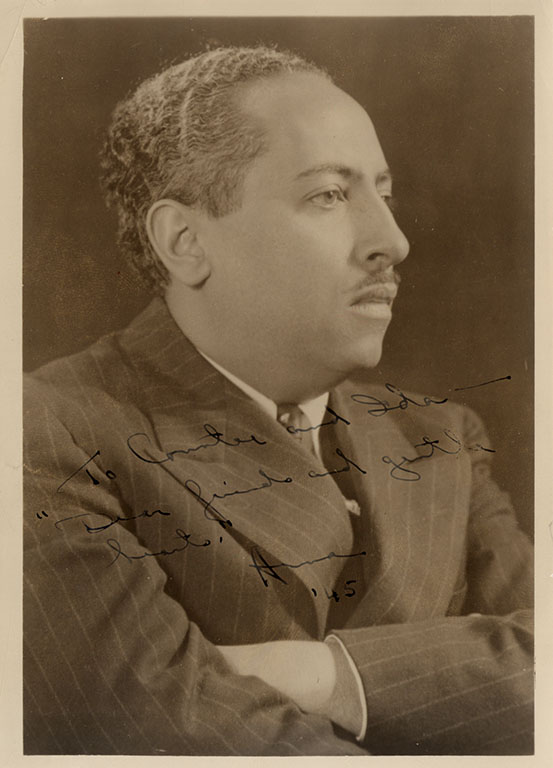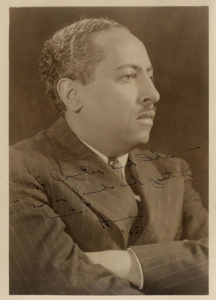“Too Damn Mean to Cry”
A Harlem Renaissance look at the ruin of a man
Published: August 30, 2019
Last Updated: May 25, 2022

Amistad Research Collection
A picture of Arna Bontemps inscribed to friends Countee and Ida Cullen reads “To Countee and Ida—‘Dear friends and gentle hearts.’ Arna, ‘45.”
I picked up a copy of Arna Bontemps’s God Sends Sunday with trepidation. The cover of my reprint edition resembles the Dick Francis crime novels my grandmother once devoured: a cartoon racehorse in Muybridgian mid-gallop, its jockey surfing each stride from his saddle, edging the steed toward the inner rails and victory.
Bontemps’s hero—though that’s a relative term—is Little Augie, a diminutive rascal raised on a post-Emancipation Red River plantation. Too frail for tilling and toiling in the dirt, he gravitates toward the plow horses. These beasts of burden made Little Augie feel big. Big enough to dream of a better life.
Augie stows away on a downriver steamboat and disembarks in New Orleans. After a few days of begging for bananas to fill his belly, he stumbles upon the Fair Grounds, the second oldest racing site in America. There, Augie falls in with an ancient stableman named Bad-foot Dixon, who teaches his young charge how to massage the muscles of prized Thoroughbreds, how to drink whiskey and throw dice.
One spring morning, a few years later, Augie’s stable finds itself without enough riders to fill the board. He saddles up a filly named Jennie Rose and easily coasts to victory. It was a win foretold in the womb from whence Augie grew. Born with a caul, Little Augie was blessed with good luck that would compel him to wander this mean world until his streak ran out. But as long as that good fortune prevailed, Augie would turn the mean world green.
Cash fills Augie’s pockets, winnings from his track victories and post-race dice games. He wears his jockey stripes by day, and at night hits the town dripping with diamonds and pearls. He sports mirror-toed loafers, a new suit for every day of the week—including three for Sunday—and gold teeth where his canines once fanged. He overindulges in whiskey and women. Little Augie “was getting biggity,” Bontemps writes. He soon earns the nickname Little Poison.
Born in Alexandria in 1902, Arna Bontemps never lived in New Orleans, and, aside from God Sends Sunday, rarely wrote about his home state. When he was three years old, his Afro-Creole family joined the Great Migration west, settling in the city of Watts outside Los Angeles. At some point, his grandmother’s long-lost younger brother appeared on the family’s doorstep. Joe “Buddy” Ward was a masterful storyteller, an elegant Crescent City pâtissier turned professional wastrel, who had squandered the good life on alcohol and gambling.
Enamored with the Harlem Renaissance, Bontemps moved to New York in 1924 and became a noted member of the artistic and intellectual eruption. Chiefly known as a poet, he turned to fiction in 1931 with the publication of Little Augie’s tale, a novel modeled on his great uncle Buddy’s Icarian existence. Soon after Bontemps gifted Buddy a copy of his book, Augie’s inspiration was struck and killed while staggering alongside a highway. Bontemps would go on to write dozens of titles—novels, biographies of black icons, and children’s books—and a Little Augie–centered Broadway musical named St. Louis Woman, which, though a box-office flop, contributed a pair of gems to the Tin Pan Alley repertoire: “Any Place I Hang My Hat Is Home” and “Come Rain or Come Shine.”
You don’t have to know Buddy’s story or understand the laws of Newtonian physics to guess which direction poisonous Little Augie will be heading. He relocates to St. Louis, where his luck swiftly turns after he guns down a rival for a lady’s affections. He returns to New Orleans, squandering races, women, and his prodigious wardrobe, before hitting the rails, hoboing who knows where.
Thirty years later, Augie turns up drunk and desolate on his sister’s doorstep in the Mudtown district of Watts. “I got de down-yonders,” he laments, “an’ I’m too damn mean to cry.” He attempts to settle down in California to shepherd his nephew’s love for horses, to rediscover that once-famous luck. But the mean world beckons, and he soon decamps down to Tijuana, a horsing hotbed and the eternal salvation of fugitive Americans like my father, who hauled me there on more than one occasion. “Come day, go day, God send Sunday,” reads the ancient Britishism that gives Bontemps’s book its title. We know it better as the prayer of salvation of the lazy and the laissez-faire: easy come, easy go.
Are there happy horse-racing stories? Visit a track most any time of day and you’ll find dozens of down-yonder men: drunk, destitute, sifting through piles of discarded betting slips, touting inside tips on can’t-lose wagers. My father didn’t pass on a love for the races, but he did, time and time again, leave me with the only useful advice he had to offer, a joke he no doubt learned from his own father, an adage that both failed to themselves follow. “You want a tip?” he’d ask everyone he came across. “Don’t bet on the horses.”
Rien Fertel’s most recent book is Southern Rock Opera. If you have recommended readings for future Lost Lit columns, please sent to [email protected].
